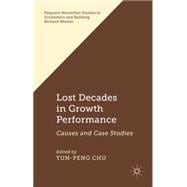There have been many noticeable incidents of 'lost decades' in economic growth, occurring in countries across the world. It has been found that in many economies, the lost decade phenomenon persists, even after the conventional set of contributing factors such as per capita income, fertility rate, life expectancy, rule of law, educational attainment, ratio of investment to national income, and openness have been taken into account.
This book explains where and how these lost decades in economic growth occur in the world. The authors identify that dominant macroeconomic factors contributing to their occurrence are an abnormal supply of credits relative to national income, and poor demand management. The study pays special attention to the cases of Japan, South Korea and Taiwan, exploring their specific cases and analyzing contributing factors. While Japan suffered from excessive credit prior to the bubble bursting, and from insufficient domestic demand subsequently, Korea's growth has been stunted through structural imbalances between and within industries, as well as through changes in the orientation of public policies from growth to equality. Adversely, reduced economic growth in Taiwan has led from its populism-ridden democracy and mass media, as well as from internal disputes over national identity.
Lost Decades in Growth Performance provides a revealing insight into the factors affecting economic growth across the world, and will be an invaluable resource for anyone with an interest in global and Asian economics. It also offers a fundamental source of reference for students and academics in general equilibrium models, economic development and East Asian economies.
This book explains where and how these lost decades in economic growth occur in the world. The authors identify that dominant macroeconomic factors contributing to their occurrence are an abnormal supply of credits relative to national income, and poor demand management. The study pays special attention to the cases of Japan, South Korea and Taiwan, exploring their specific cases and analyzing contributing factors. While Japan suffered from excessive credit prior to the bubble bursting, and from insufficient domestic demand subsequently, Korea's growth has been stunted through structural imbalances between and within industries, as well as through changes in the orientation of public policies from growth to equality. Adversely, reduced economic growth in Taiwan has led from its populism-ridden democracy and mass media, as well as from internal disputes over national identity.
Lost Decades in Growth Performance provides a revealing insight into the factors affecting economic growth across the world, and will be an invaluable resource for anyone with an interest in global and Asian economics. It also offers a fundamental source of reference for students and academics in general equilibrium models, economic development and East Asian economies.








